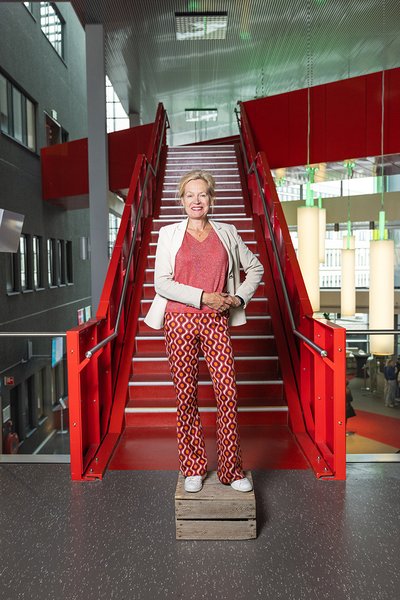PIT magazine
The applied research conducted at universities of applied sciences makes an important contribution to the search for solutions to the major social and economic challenges facing the Netherlands. In this article Anka Mulder, director of Saxion University of Applied Sciences, offers her view on the importance of applied research in the development of key technologies and the current state of play in applied research in the Netherlands. Where are we performing well and where is there room for improvement?
More European cooperation is the next step
"When it comes to research, people usually think of traditional universities. Fortunately, however, the research conducted by universities of applied sciences is achieving greater prominence and there is growing recognition of the importance of applied research. We are knowledge accelerators. Our research cycles are short and demand-driven. Companies with a problem come to us for help in finding a solution. It is also logical that they turn to us, since we are part of the lifeblood of a region and the work we do leaves its imprint everywhere.
Saxion invests heavily in applied research. Topics include investigating ways of enabling people to live a vigorous and independent life at home for as long as possible and developing scenarios for a sustainable lifestyle in the smart city of the future. Key technologies play an important role in addressing those issues. As they do in OBSeRVeD, a project that we coordinate, in which an electronic nose that can smell disease in poultry is being developed. Infected animals give off a specific odour. If the smell sensor picks it up at an early stage, a farmer can quickly take appropriate measures, such as adapting the composition of the feed, and so avoid the need to administer extra antibiotics and prevent outbreaks of diseases in animals."
"Partnerships with industry, research universities and other universities of applied sciences are important for projects like this. An example of this collaboration is TechForFuture, a centre of expertise for applied research into key enabling technologies that we have jointly established with Windesheim. To improve their bargaining position in relation to business partners and the funders of research projects, universities of applied sciences need to pool their strengths. We’re getting better at that. We initially depended entirely on the Taskforce for Applied Research SIA, but now also secure grants from the National Growth Fund and the Dutch Research Agenda.
The next step is to strengthen the cooperation at European level. As a university of applied sciences, we already participate in the European Universities Initiative. But there are opportunities to make an even greater impression on the European stage. We have a lot to offer, but we are reaching our limits and additional capacity is required if we are going to make the next step. And that means more money. Hopefully, a new government will also see the need for this and increase its funding.”

